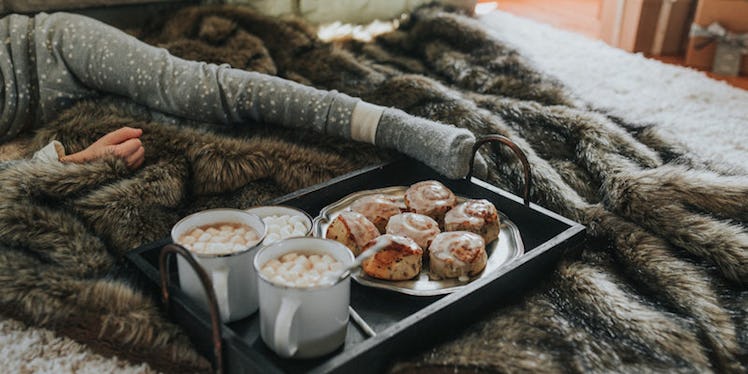
This Is Why You're Always So Hungry When The Weather Starts Getting Cold
Once it starts getting cold out, my friends and I only talk about two things: eating and sleeping.
All other interests go out the window, lost to the frigid air, and our energy gets channeled toward maintaining our bodies' homeostases until the sun returns and beams vitamin D back into our brittle, winter-worn souls.
Sure, nestling yourself in a soft blanket is objectively more appealing than shivering out in the cold (unless you enjoy chattering teeth), but why do we get so hungry as the seasons change?
It turns out it's not just all in your head, and you are far from alone.
One study found participants' BMIs increased as summer transitioned to fall, while another saw participants upping their consumption of animal fat with meat and dairy as the weather got colder (most likely causing a greater BMI).
I could speculate it's just really comforting to devour a whole pizza and guzzle a bottle of wine on a dark and gloomy Friday night, but I don't have to guess. There's a lot of research to explain the reasons our bodies respond to decreasing temperatures with hunger.
It's our primitive instinct.
Apparently, the fittest survived by upping their calorie intake as the days got shorter and colder.
Cardiologist Ira Ockene explains to NPR,
We are driven by things implanted in our brain a long, long time ago.
His research conducted at the University of Massachusetts Medical School found that, in 593 participants from 20-70 years old, people consumed an average of 86 more daily calories in the fall than in the spring.
He says because the days get dark earlier, we're biologically compelled to seek out more food at once and eat faster than usual -- an ingrained behavior he likens to what a chipmunk does.
Ockene also cites an earlier study in which participants ate more as the seasons changed but reported still being hungry despite the larger meals, suggesting the seasonal effect on hunger might overpower normal satiety triggers.
We're more active than we realize.
While it's hard to argue shivering counts as exercise, your body does use extra energy in trying to heat up this way. If you're expending more energy than your body is used to, you'll probably crave more energy replenishment (via food).
Even if the thermostat isn't dipping below freezing and your body doesn't have a visible physical reaction, mild cold weather can still have a similar effect.
Chilly temps can induce something called “nonshivering thermogenesis (NST)," which is when your body works to produce more heat without the twitchy muscular response.
Freezing or not, your body's exerting more energy than usual to adjust to cooler air, so it makes sense to feel hungrier after being outside (or in a cold room) and working up a (theoretical) shiver.
It's the time of year.
Marcia Pelchat from the Monell Chemical Senses Center in Philadelphia explained to NPR that the holiday season simply provides a lot of chances to eat indulgent meals.
The more food you're around, the harder it is to walk away from the buffet table with some lettuce, a cup of water and no apple pie.
On top of there being more treats out for the picking, there are cognitive links between the time of year and particular foods.
For example, if your mom always baked gingerbread Christmas tree cookies in December, your body will crave cookies in December because, aside from dessert being delicious, your mind associates that month with... you guessed it, cookies.
We're seeking comfort.
Even though I was just guessing earlier about finding comfort in pizza and wine, I wasn't wrong.
Aside from the physical nuisances of winter, the cold, dark days can also take an emotional toll on us. We're uncomfortable and stiff, the days seem over as soon as the sun sets at 5 pm and our skin is dry and cracked.
Enter: “comfort food.”
When things in life are unpleasant, people crave foods that have nostalgic ties, like meals their moms used to cook for them when they were little. Eating those foods evokes sentiments of that relationship and quells any feelings of isolation.
In addition to any sort of psychological attachment to certain snacks from childhood, there are social factors that help us decide what foods will solve our problems.
Particular foods have become accepted as soothing or warm, and TV shows and movies strengthen those associations any time characters drink or eat their sorrows away with things like red wine and ice cream.
So, even if there's no scientific reason sweets heal a broken heart, the mental link pop culture has provided is enough to placate our anxieties to a certain degree.
And there's definitely solace in thinking, “Well, ice cream makes everyone feel better, so I'll feel better after eating it, too.”
So, go on; Seamless with wild abandon. Science says it's OK.